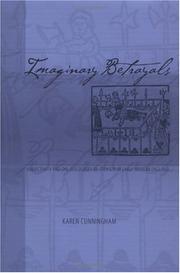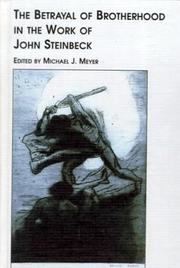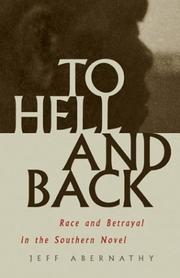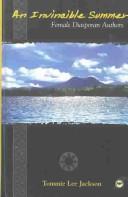| Listing 1 - 10 of 11 | << page >> |
Sort by
|
Book
ISBN: 1282988336 9786612988332 1846157722 1855661888 Year: 2009 Publisher: Woodbridge, U.K. ; Rochester, N.Y. : Tamesis,
Abstract | Keywords | Export | Availability | Bookmark
 Loading...
Loading...Choose an application
- Reference Manager
- EndNote
- RefWorks (Direct export to RefWorks)
Representations of treachery in medieval and early modern Spain. Treacherous Foundations is the first sustained study of the theme of treachery in the founding myths of the Iberian Peninsula. It considers literary versions, in epic, chronicle and theatre, of the legends of Fernán González, Bernardo del Carpio and King Sancho II from medieval and early modern Spain and compares the representation of treachery across two critical periods in Spanish history, assessing its political, ideological, and cultural function. This book explores the role played by representations of treachery in foundational texts in highlighting the ideological tensions that arise from movements toward the creation of collective identities. It discusses in particular visions of nationhood and the monarchical state in the thirteenth and late sixteenth centuries. The theme of treachery is expanded to cover all aspects of treason and political disloyalty and, engaging with loyalty, trust and the nature of kingship, the volume sheds new light on aspects of Spanish cultural and political history, and provides insight into the nature of myth and collective memory, historical change and the collective response to crisis. GERALDINE COATES lectures in Medieval Spanish Literature at the University of Oxford.
Spanish literature --- Betrayal in literature. --- History and criticism. --- Founding Myths. --- Generational Differences. --- Global Vision. --- Iberian Peninsula. --- Medieval Spain. --- Political Ideologies. --- Thematic Concerns. --- Treachery.
Book
ISBN: 9780823230426 9780823230433 Year: 2009 Publisher: New York Fordham university press
Abstract | Keywords | Export | Availability | Bookmark
 Loading...
Loading...Choose an application
- Reference Manager
- EndNote
- RefWorks (Direct export to RefWorks)
American literature --- Betrayal in literature --- Comparative literature --- Ethics in literature --- Race relations in literature --- Minority authors --- History and criticism --- Theory, etc
Multi
ISBN: 9780823237326 9780823230426 9780823230433 Year: 2009 Publisher: New York, N.Y. Fordham University Press
Abstract | Keywords | Export | Availability | Bookmark
 Loading...
Loading...Choose an application
- Reference Manager
- EndNote
- RefWorks (Direct export to RefWorks)
Literature --- American literature --- Betrayal in literature --- Comparative literature --- Ethics in literature --- Race relations in literature --- Minority authors --- History and criticism --- Theory, etc
Book
ISBN: 0719098246 1781708835 0719098254 9780719098253 9780719088537 9780719098246 9781526127105 0719088534 9781781708835 Year: 2015 Publisher: Manchester
Abstract | Keywords | Export | Availability | Bookmark
 Loading...
Loading...Choose an application
- Reference Manager
- EndNote
- RefWorks (Direct export to RefWorks)
This title argues that modern Irish history encompasses a deep-seated fear of betrayal, and that this fear has been especially prevalent throughout Irish society since the revolutionary period at the outset of the twentieth century.
English fiction --- History and criticism. --- History and criticism --- Betrayal in literature. --- Literature --- Literary Studies: From C 1900 --- -LITERARY CRITICISM / European / English, Irish, Scottish, Welsh --- Ireland --- Irish authors --- English literature --- Betrayal. --- Ireland. --- Joyce. --- Novel. --- Treason.
Book
ISBN: 9780748676620 0748676627 9780748655830 0748655832 9780748655854 0748655859 9780748655847 0748655840 9780748655823 0748655824 1299105580 9781299105584 Year: 2012 Publisher: Edinburgh : Edinburgh University Press,
Abstract | Keywords | Export | Availability | Bookmark
 Loading...
Loading...Choose an application
- Reference Manager
- EndNote
- RefWorks (Direct export to RefWorks)
"Penelope Anderson's original study changes our understanding both of the masculine Renaissance friendship tradition and of the private forms of women's friendship of the eighteenth century and after. It uncovers the latent threat of betrayal lurking within politicized classical and humanist friendship, showing its surprising resilience as a model for political obligation undone and remade. Incorporating authors from Cicero to Abraham Cowley and Margaret Cavendish to Mary Astell, the book focuses on two extraordinary women writers, the royalist Katherine Philips and the republican Lucy Hutchinson. And it explores the ways in which they appropriate the friendship tradition in order to address problems of conflicting allegiances in the English Civil Wars and Restoration. As Penelope Anderson suggests, their writings on friendship provide a new account of women's relation to public life, organized through textual exchange rather than bodily reproduction." [Publisher's description].
English literature --- Female friendship --- Friendship in literature. --- Betrayal in literature. --- Friendship between women --- Friendship in women --- Women's friendship --- Friendship --- History and criticism. --- Women authors --- History --- Women --- Intellectual life --- Human females --- Wimmin --- Woman --- Womon --- Womyn --- Females --- Human beings --- Femininity
Book
ISBN: 0823235076 0823247155 1282699008 9786612699009 082323732X 0823230449 0823230422 0823230430 Year: 2009 Publisher: Fordham University Press
Abstract | Keywords | Export | Availability | Bookmark
 Loading...
Loading...Choose an application
- Reference Manager
- EndNote
- RefWorks (Direct export to RefWorks)
In An Ethics of Betrayal, Crystal Parikh investigates the theme and tropes of betrayal and treason in Asian American and Chicano/Latino literary and cultural narratives. In considering betrayal from an ethical perspective, one grounded in the theories of Emmanuel Levinas and Jacques Derrida, Parikh argues that the minority subject is obligated in a primary, preontological, and irrecusable relation of responsibility to the Other. Episodes of betrayal and treason allegorize the position of this subject, beholden to the many others who embody the alterity of existence and whose demands upon the subject result in transgressions of intimacy and loyalty. In this first major comparative study of narratives by and about Asian Americans and Latinos, Parikh considers writings by Frank Chin, Gish Jen, Chang-rae Lee, Eric Liu, Américo Parades, and Richard Rodriguez, as well as narratives about the persecution of Wen Ho Lee and the rescue and return of Elian González. By addressing the conflicts at the heart of filiality, the public dimensions of language in the constitution of minority "community," and the mercenary mobilizations of "model minority" status, An Ethics of Betrayal seriously engages the challenges of conducting ethnic and critical race studies based on the uncompromising and unromantic ideas of justice, reciprocity, and ethical society.
Race relations in literature. --- Comparative literature. --- Ethics in literature. --- Betrayal in literature. --- American literature --- English literature --- Agrarians (Group of writers) --- Comparative literature --- Literature, Comparative --- Philology --- Minority authors --- History and criticism --- Theory, etc.

ISBN: 0812204271 0812236408 Year: 2002 Publisher: University of Pennsylvania Press
Abstract | Keywords | Export | Availability | Bookmark
 Loading...
Loading...Choose an application
- Reference Manager
- EndNote
- RefWorks (Direct export to RefWorks)
In 1352 King Edward III had expanded the legal definition of treason to include the act of imagining the death of the king, opening up the category of "constructive" treason, in which even a subject's thoughts might become the basis for prosecution. By the sixteenth century, treason was perceived as an increasingly serious threat and policed with a new urgency. Referring to the extensive early modern literature on the subject of treason, Imaginary Betrayals reveals how and to what extent ideas of proof and grounds for conviction were subject to prosecutorial construction during the Tudor period. Karen Cunningham looks at contemporary records of three prominent cases in order to demonstrate the degree to which the imagination was used to prove treason: the 1542 attainder of Katherine Howard, fifth wife of Henry VIII, charged with having had sexual relations with two men before her marriage; the 1586 case of Anthony Babington and twelve confederates, accused of plotting with the Spanish to invade England and assassinate Elizabeth; and the prosecution in the same year of Mary, Queen of Scots, indicted for conspiring with Babington to engineer her own accession to the throne. Linking the inventiveness of the accusations and decisions in these cases to the production of contemporary playtexts by Udall, Shakespeare, Marlowe, and Kyd, Imaginary Betrayals demonstrates how the emerging, flexible discourses of treason participate in defining both individual subjectivity and the legitimate Tudor state. Concerned with competing representations of self and nationhood, Imaginary Betrayals explores the implications of legal and literary representations in which female sexuality, male friendship, or private letters are converted into the signs of treacherous imaginations.
Sex role in literature. --- English drama --- Law in literature. --- Betrayal in literature. --- Treason in literature. --- Trials (Treason) --- Subjectivity in literature. --- Law and literature --- Treason --- History and criticism. --- History --- Law. --- Literature. --- Medieval and Renaissance Studies.

ISBN: 0773478353 Year: 2000 Publisher: Lewiston Mellen
Abstract | Keywords | Export | Availability | Bookmark
 Loading...
Loading...Choose an application
- Reference Manager
- EndNote
- RefWorks (Direct export to RefWorks)
Betrayal in literature --- Brotherliness in literature --- Brothers in literature --- Religion in literature --- Abel (Biblical figure) --- Cain (Biblical figure) --- Steinbeck, John, --- In literature. --- Characters --- Brothers. --- Criticism and interpretation. --- West (U.S.)

ISBN: 0820324868 0820325783 Year: 2003 Publisher: Athens University of Georgia press
Abstract | Keywords | Export | Availability | Bookmark
 Loading...
Loading...Choose an application
- Reference Manager
- EndNote
- RefWorks (Direct export to RefWorks)
African Americans in literature --- American fiction --- Betrayal in literature --- Race in literature --- Race relations in literature --- Social ethics in literature --- History and criticism --- Twain, Mark, --- Influence. --- Southern States --- In literature.

ISBN: 0865438242 0865438234 Year: 2001 Publisher: Trenton, NJ Africa World Press
Abstract | Keywords | Export | Availability | Bookmark
 Loading...
Loading...Choose an application
- Reference Manager
- EndNote
- RefWorks (Direct export to RefWorks)
Abandoned children in literature --- Betrayal in literature --- Enfants abandonnés dans la littérature --- Loss (Psychology) in literature --- Perte (Psychologie) dans la littérature --- Trahison dans la littérature --- Verlaten kinderen in de literatuur --- Verlies (Psychologie) in de literatuur --- Verraad in de literatuur --- Abandoned children in literature. --- African American women in literature. --- African American women --- American literature --- Betrayal in literature. --- Caribbean literature (English) --- English literature --- Loss (Psychology) in literature. --- Women and literature --- Women, Black, in literature. --- Intellectual life. --- African American authors --- History and criticism. --- African influences. --- Women authors --- Black authors --- History and criticism --- African influences --- United States --- Authors [Black ] --- English-speaking countries --- Women and literature - English-speaking countries.
| Listing 1 - 10 of 11 | << page >> |
Sort by
|

 Search
Search Feedback
Feedback About UniCat
About UniCat  Help
Help News
News